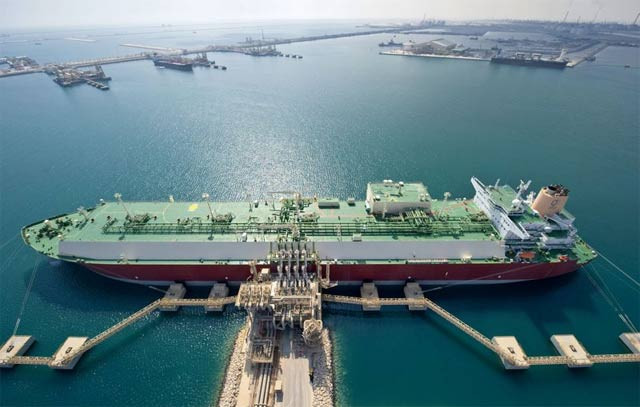CCP declares LNG deal with Qatar ‘non-transparent'
Says agreement has been struck at rates that are higher than India’s

A ship loads up with liquid natural gas, of which Qatar is the world's biggest exporter. PHOTO SOURCE: QATAR PETROLEUM
In its detailed ‘Competition Assessment Study of LNG’, the Competition Commission of Pakistan (CCP) recommended the government to renegotiate the price with Qatar and also make the government-to-government deal public.
Senate chairman invites foreign investment
The findings of the study, which are open for comments from the public and stakeholders, could put the Pakistan Tehreek-e-Insaf (PTI) government under pressure to fulfill its promise of sharing the deal with parliament.
“There is a lack of transparency in the long term government-to-government agreement between Pakistan State Oil (PSO) and Qatargas as to when the terms of contract may be renegotiated,” stated the report.
There was also a lack of transparency about what the price review clause is (an integral part of a long-term contract between a seller and a buyer) and when the pricing can be renegotiated.
The CCP study noted that the LNG Sale Purchase Agreement (SPA) is available on the official website of PSO, however, for the most part, the document is blocked for public viewing and therefore inaccessible for the common man.
PSO and Qatargas signed a 15-year LNG SPA in 2016 as a result of which LNG will be imported till 2031 at the contract price of 13.36% of Brent crude price.
The report found that the prices were higher in Pakistan compared to other similar agreements signed by Pakistan and even by regional countries.
“India renegotiated its long-term LNG agreement with Qatar in 2016 and the LNG price was set at 12.66% of Brent crude,” the CCP pointed out. India and Qatar reduced the price and removed the floor and cap on the prices. “Lack of transparency in long-term LNG contract creates mistrust among LNG end-consumers who are paying for the expensive RLNG,” added the CCP. “Consumers consequently cannot make informed decisions. In the face of rising price of Brent in the international market, the price of RLNG will continue to rise.”
PSO and Qatargas signed the 15-year agreement under which Qatargas is supplying 3.75MTPA of LNG to Pakistan at 13.37% of Brent. PSO has also executed an SPA with Gunvor (medium term contract) to supply 0.75MTPA of LNG for 5 years. The Pakistan LNG Limited (PLL) has executed an SPA with Eni for supply of LNG for 15 years (long-term contract) to supply one cargo per month (0.75MTPA) to Pakistan at 11.6247% of Brent.
The study also noted that the Port Qasim charges of the LNG imported from Qatar were also higher. The Port Qasim Authority (PQA) charges LNG cargoes which are handled at the port for using port. The Port Qasim charges $600,000 per LNG vessel that is received at the port. These port charges are shared by both the supplier and procurer of LNG. In case of the Qatar LNG deal, $320,000 are paid by Qatargas (the exporter) and $280,000 are paid by PSO. But in case of the 5 year Term Tender with Gunvor, $500,000 are borne by Gunvor (supplier) and $100,000 by PSO.
NAB told to probe LNG contract with Qatar
“It is therefore recommended that the port charges should be competitive and comparable to other regional players procuring LNG,” added the study.
The CCP study underlined that contrary to the globally traded natural gas prices, Pakistan’s LNG SPA’s are indexed to Brent price. In the face of global oil market volatility some of the features of the standard SPAs like “Take or Pay” and “Contract Price Review” need to be revisited, suggested the anti-trust watchdog.
It added these features are seen to be “restrictive” and potentially “divergent” from market forces of demand and supply. If the price review period could be negotiated to a lower term then this disparity between contract and competitive prices could be lessened as it would be closer to prevalent market prices, said the CCP.
“It is pivotal to negotiate pricing arrangements in particular “DES price’- to be paid by the importer periodically in order to procure the most competitive deal,” according to the watchdog.
The study showed various barriers to competition at all levels of the LNG value chain including midstream due to the regasification at the Engro Elengy Terminal Limited (EETL) and Pakistan Gasport Consortium Limited (PGPC) terminal at the high tolling tariff of $0.479 per mmbtu and $0.4177 per mmbtu respectively.
Published in The Express Tribune, November 16th, 2018.
Like Business on Facebook, follow @TribuneBiz on Twitter to stay informed and join in the conversation.



















COMMENTS
Comments are moderated and generally will be posted if they are on-topic and not abusive.
For more information, please see our Comments FAQ